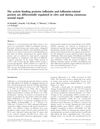 15 citations,
June 2018 in “Food Reviews International”
15 citations,
June 2018 in “Food Reviews International” Pumpkin seed oil may improve prostate health, bladder control, and hair growth in men.
4 citations,
January 2023 in “Andrology” The testes produce sperm and hormones essential for male development.
 85 citations,
September 2013 in “International Journal of Molecular Sciences”
85 citations,
September 2013 in “International Journal of Molecular Sciences” Keratin 15 is not a reliable sole marker for identifying epidermal stem cells because it's found in various cell types.
 July 2024 in “International Journal of Molecular Sciences”
July 2024 in “International Journal of Molecular Sciences” Hemp seed biomaterials may reduce hair loss and improve hair growth.
81 citations,
January 2000 in “American journal of clinical dermatology” Various treatments can improve post-acne scars, but results vary.
 220 citations,
August 1988 in “Clinical endocrinology”
220 citations,
August 1988 in “Clinical endocrinology” Melatonin may help with sleep issues, depression, and cancer, but more research is needed.
 129 citations,
May 2015 in “Cell Stem Cell”
129 citations,
May 2015 in “Cell Stem Cell” Different types of stem cells exist within individual skin layers, and they can adapt to damage, transplantation, or tumor growth. These cells are regulated by their environment and genetic factors. Tumor growth is driven by expanding, genetically altered cells, not long-lived mutant stem cells. There's evidence of cancer stem cells in skin tumors. Other cells, bacteria, and genetic factors help maintain balance and contribute to disease progression. A method for growing mini organs from single cells has been developed.
 March 2023 in “Lecture Notes in Education Psychology and Public Media”
March 2023 in “Lecture Notes in Education Psychology and Public Media” Beards and long hair may affect how attractive someone is to the opposite sex.
71 citations,
November 2005 in “The journal of investigative dermatology. Symposium proceedings/The Journal of investigative dermatology symposium proceedings” Edar signaling is crucial for proper hair follicle development and function.
 51 citations,
April 1999 in “The Journal of Steroid Biochemistry and Molecular Biology”
51 citations,
April 1999 in “The Journal of Steroid Biochemistry and Molecular Biology” Testosterone replacement may improve sexual desire and bone health in women with low androgen levels, but more research is needed on its long-term safety.
 32 citations,
November 2004 in “Journal of pharmaceutical sciences”
32 citations,
November 2004 in “Journal of pharmaceutical sciences” Different tea tree oil mixtures absorb into hair follicles at varying levels, with microemulsion being the most effective.
January 2024 in “Cosmetics” Menopause worsens skin, hair, and nails, affecting self-esteem and quality of life.
3 citations,
August 2017 in “Springer eBooks” The document explains breast development, common breast conditions, and their treatments.
 73 citations,
March 2010 in “Food and Chemical Toxicology”
73 citations,
March 2010 in “Food and Chemical Toxicology” Zizyphus jujuba essential oil can promote hair growth.
110 citations,
December 2013 in “The journal of investigative dermatology. Symposium proceedings/The Journal of investigative dermatology symposium proceedings” Alopecia areata is a genetic and immune-related hair loss condition that is often associated with other autoimmune diseases and does not typically cause permanent damage to hair follicles.
 2 citations,
March 2020 in “International Journal of Molecular Sciences”
2 citations,
March 2020 in “International Journal of Molecular Sciences” Topical treatments can deliver active molecules to skin stem cells, potentially helping treat skin and hair disorders, including skin cancers and hair loss.
 4 citations,
October 2013 in “Springer eBooks”
4 citations,
October 2013 in “Springer eBooks” Melatonin receptors, found in many body parts, can help treat various diseases like depression and diabetes due to their effects on inflammation, tumor progression, sleep disorders, and body mass regulation.
 8 citations,
April 1988 in “Journal of endocrinological investigation”
8 citations,
April 1988 in “Journal of endocrinological investigation” Topical spironolactone cream doesn't cause hormone-related side effects in the body.
 35 citations,
April 2008 in “Human Molecular Genetics”
35 citations,
April 2008 in “Human Molecular Genetics” Skin and hair can help us understand organ regeneration, especially how certain stem cells might be used to form new organs.
 46 citations,
December 2001 in “Journal of Endocrinology/Journal of endocrinology”
46 citations,
December 2001 in “Journal of Endocrinology/Journal of endocrinology” FLRG and follistatin have different roles in wound healing.
 January 2024 in “International Research Journal Of Modernization In Engineering Technology And Science”
January 2024 in “International Research Journal Of Modernization In Engineering Technology And Science” Hair growth serums reduce hair fall and improve growth with mostly positive reviews.
 9 citations,
March 2023 in “Biomimetics”
9 citations,
March 2023 in “Biomimetics” New materials that better mimic natural skin structure could improve healing, especially for chronic wounds.

Thermal spring waters and their microbes could be good for skin health and treating some skin conditions in skincare products.

Early NAS level changes affect alcohol consumption vulnerability.
 13 citations,
April 2019 in “iScience”
13 citations,
April 2019 in “iScience” EGFR helps control how hair grows and forms without needing p53 protein.
 25 citations,
March 2000 in “Journal of Endocrinological Investigation”
25 citations,
March 2000 in “Journal of Endocrinological Investigation” Testosterone therapy aims to treat hormone deficiencies and various conditions safely and effectively, but requires careful patient monitoring due to potential side effects.
 October 2023 in “bioRxiv (Cold Spring Harbor Laboratory)”
October 2023 in “bioRxiv (Cold Spring Harbor Laboratory)” Immune cells are essential for early hair and skin development and healing.
10 citations,
February 2021 in “International Journal of Nanomedicine” Chitosan-decorated finasteride nanosystems improve skin retention and could be a better treatment for hair loss.
 21 citations,
May 2021 in “Prostate Cancer and Prostatic Diseases”
21 citations,
May 2021 in “Prostate Cancer and Prostatic Diseases” COVID-19 might worsen symptoms and progression of benign prostatic hyperplasia, possibly due to inflammation and metabolic disturbances in the prostate gland. More research is needed to confirm this.






















